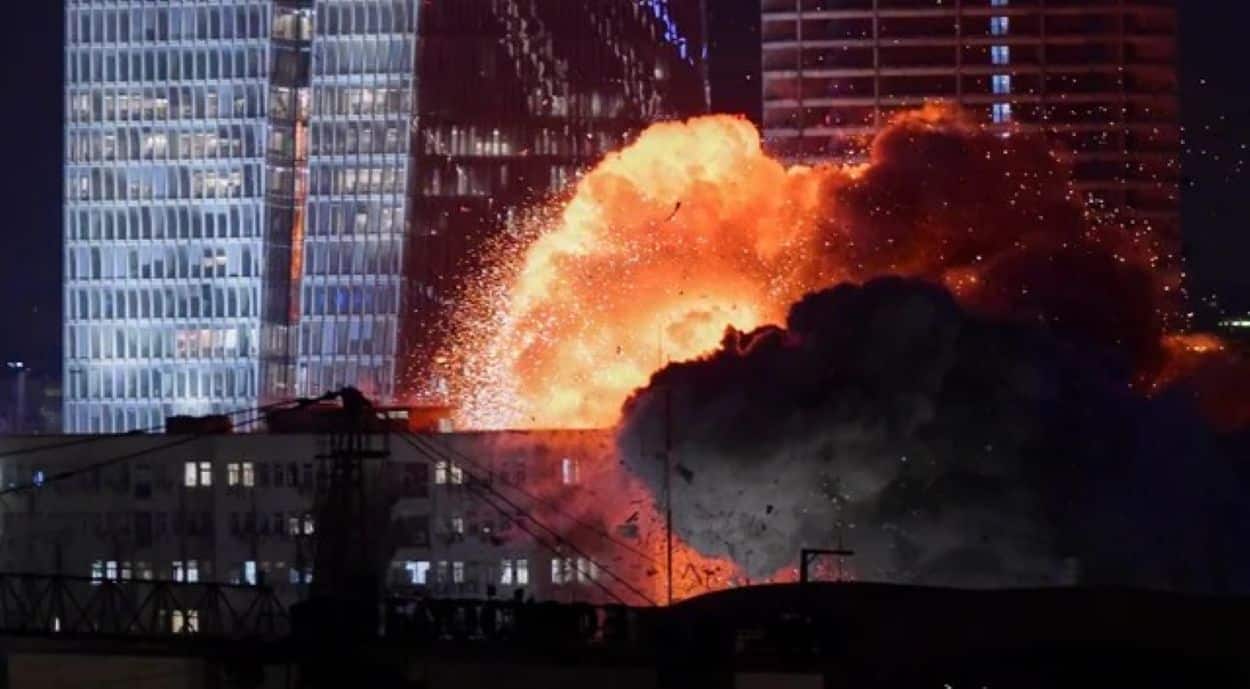On June 13, 2025, Iran launched a missile barrage targeting Tel Aviv and Jerusalem, codenamed Operation Severe Punishment, in retaliation for Israel’s airstrikes on its nuclear facilities and military leadership earlier that day. The attack, involving dozens of ballistic missiles, marked a dramatic escalation in the Israel-Iran conflict, as reported by Reuters.
Iran’s Missile Attack: Details and Impact
Iran’s Islamic Revolutionary Guard Corps (IRGC) fired around 100 ballistic missiles at Israeli military and civilian sites, with some striking central Tel Aviv and causing damage near the IDF’s Kirya headquarters, according to The Washington Post. Sirens blared across Israel, and explosions lit up the night sky as Israel’s Iron Dome and Arrow systems intercepted many missiles, though some caused damage.
Israeli emergency services reported at least 41 injuries, with two in serious condition, and one confirmed death in Ramat Gan, per ABC News. Damaged buildings included an apartment block in Ramat Gan and a residential structure in central Tel Aviv. Iran’s state media, IRNA, claimed the strikes targeted military installations in response to Israel’s “aggression.”
"I've reported here for nearly seven years and never seen such an attack against an Israeli city."
FOX News Chief Foreign Correspondent @TreyYingst reports from Tel Aviv while taking cover from Iranian missile attack. pic.twitter.com/Re6gYjRHm4
— Fox News (@FoxNews) June 13, 2025Context: Israel’s Airstrikes on Iran
Hours earlier, Israel launched Operation Rising Lion, targeting Iran’s Natanz nuclear facility, Isfahan nuclear site, and missile production sites, killing IRGC chief Hossein Salami, armed forces chief Mohammad Bagheri, and nuclear scientists, per Tasnim News Agency. Israel’s Prime Minister Benjamin Netanyahu called the strikes a preemptive move to thwart Iran’s nuclear ambitions, invoking historical parallels to justify the operation. Iran reported 78 deaths, mostly civilians, and over 320 injuries.
Prime Minister Benjamin Netanyahu:
To the proud people of Iran,
We are in the midst of one of the greatest military operations in history, Operation Rising Lion.
The Islamic regime, which has oppressed you for almost 50 years threatens to destroy our country, the State of… pic.twitter.com/C4KVYegPCi
— Mossad Commentary (@MOSSADil) June 13, 2025Supreme Leader Ayatollah Ali Khamenei vowed a “crushing response,” accusing Israel of initiating war. Iran’s weakened proxy network, including Hezbollah and Hamas, limited its indirect retaliation options, pushing Tehran toward direct missile strikes.
International Response and Nuclear Talks
U.S. President Donald Trump, aware of Israel’s plans but not involved, urged Iran to negotiate a nuclear deal, stating, “It’s not too late,” per Reuters. The U.S. aided Israel in intercepting missiles using Patriot and THAAD systems, though its role was limited compared to prior engagements. Scheduled U.S.-Iran nuclear talks in Oman were cancelled after Iran’s withdrawal.
The UN Security Council convened at Iran’s request, with Iran’s envoy condemning Israel’s “cowardly” acts. Russia and China criticised Israel, while the U.S. defended Israel’s self-defence rights. Crude oil prices surged 5% amid fears of regional disruption, though OPEC reported no supply changes.
Read: Iran’s Revolutionary Guards Chief Hossein Salami Killed in Israeli Strike
In Israel, civilians sought shelter as missiles struck, with social media showing panic and defiance. In Iran, residents reported fear, with some fleeing or exchanging currency, per Reuters. A Houthi missile from Yemen hit Hebron, injuring three Palestinian children, highlighting the conflict’s regional spread.
Iran’s missile capabilities, using Fattah-1 hypersonic missiles, challenged Israel’s defences, though analysts noted the attack’s limited strategic impact compared to Israel’s strikes.






